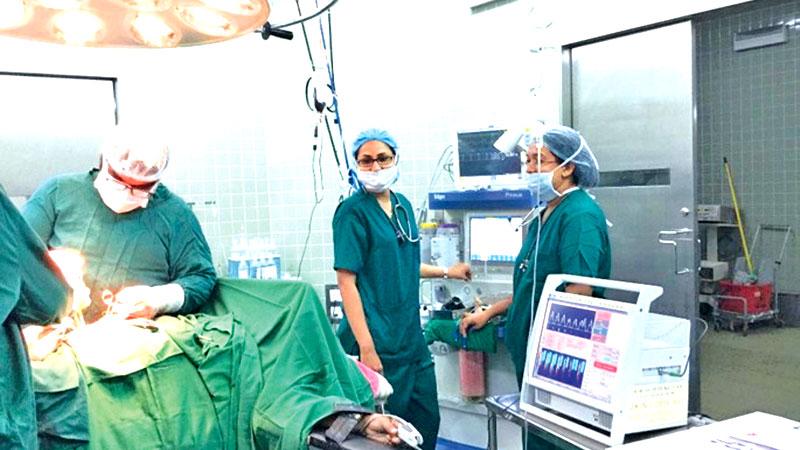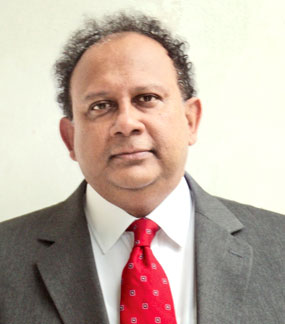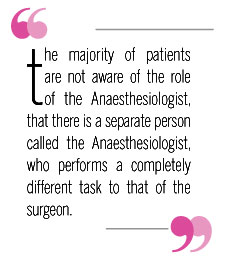
 Dr Kanishka Indraratna |
World Anaesthesia Day observed last month, brought an important albeit little discussed subject to the center stage. The focus was on safe anaesthesia which every patient requires, whether local or general, when he/she undergoes surgery. A global study recently revealed the shocking news that five in seven persons in the world (five billion of the 7 billion world population) don’t have access to quality, safe anaesthesia and surgery. The tragedy is that the impoverished S. Asian countries are among the worst affected.
The Sunday Observer spoke to the President of the College of Anaesthesiologists and Intensivists, Dr Kanishka Indraratna, to get more insight into this little known field of medicine.
Excerpts…
Q: World Anaesthesia Day fell on October 16. Why is Anaesthesia so important that a special day is now set aside to observe it globally?
A: The first successful anaesthetic was administered 170 years ago on this date. It enabled a tumor on the neck to be removed surgically, while the patient was sleeping and he was free of pain.
Before this day, surgery could not be practised as a specialty, because of the pain patients had to endure. Most often attempted surgical procedures ended up as disasters.
However, since 16 October 1846, surgery could be practised, and it allowed surgery to develop and expand into many areas.
Q: How do you define Anaesthesiology? How is it linked to Intensivists?
A: Anaesthesiology is the specialty of providing reversible unconsciousness or sedation, relief of pain during surgery, and optimal conditions for surgery along with the sub specialties of pre operative medicine, pain medicine, resuscitation, trauma management and intensive care medicine.
Intensivists care for patients who are critically ill, with one or more organ systems failing and requiring support. Anaesthesiology and Intensive care are two different specialties, but, with Anaesthesiology being mostly the foundation.
Q: Do they work as a team always when a patient is undergoing surgery and usually in an ICU?
A: In the theatre it is the Anaesthesiologist who is involved. Even a patient from an intensive care unit requiring surgery would be totally and primarily cared for by an Anaesthesiologist. Quite often, after a major surgery or a very sick patient who has undergone surgery, maybe post operatively cared for in an intensive care unit, it is the intensivist who cares for the patient in the ICU.
Q: When a patient undergoes surgery, in the West, he is required to pay a pre operative visit to consult his anaesthesiologist. However, in Sri Lanka in many cases, the choice of an anaesthesiologist is left to the surgeon and the patient has little say in choosing someone he knows or has confidence in. As a result, many hesitate to go through the procedure. Your comments?
A: The reason for that is in Sri Lanka, the majority of patients are not aware of the role of the Anaesthesiologist, that there is a separate person called the Anaesthesiologist, who performs a completely different task to that of the surgeon.
At the same time, it must be emphasized that the surgeon and the anaesthetist are a Team. The functioning of that team unit, will contribute towards a good outcome. A patient always has the liberty of requesting a particular anaesthetist if he/she wishes. However if the surgeon does not regularly work as a team with the particular anaesthetist, he can recommend someone else. As I said before, the surgeon and the anaesthetist should be able to comfortably function as a unit.
Q: When is anaesthesia needed?
A: All surgical procedures will require anaesthesia. Sometimes, other procedures, such as, endoscopic examinations, scanning, also require anaesthesia. If for any procedure it is necessary to make a patient unaware of the surroundings and able to tolerate pain, anaesthesia would be necessary.
Q: I understand there are different types of anaesthesia, and the three main types are, 1) General 2) Regional 3) Local. Can you explain what they are?
A: General, is where the patient is rendered unconscious. Regional is the entire region where the operation site is situated…If Local, only the operation site is anaesthetized.
Q: What are the side effects and complications of anaesthesia? What are the symptoms to look for in any complications in 1) general anaesthesia 2) regional and 3) local anaesthesia?
A: Complications can be minor, major and even fatal. The commonest complications are due to the management of the airway. Other common problems can be, delayed recovery, cardiac issues, human errors, equipment failure or lack of equipment.
As I mentioned before, during anaesthesia (which is an artificial state) the entire physiology of the patient changes temporarily to some degree, and therefore, unless meticulous attention is paid to all parameters every second, complications could happen. However, with the new developments in techniques, equipment and drugs, along with knowledge acquired from latest studies, anaesthesia has become extremely safe.
Q: When do complications occur?
A:. Complications can occur while the anaesthetic is in progress or after it has been concluded. Some complications can be detected with monitoring which continues during the procedure. Others are clinically detected.
For example: 1. With General Anaesthesia, delayed recovery, hypoxia, myocardial infarction, bronchospasm 2. With regional anaesthesia you can develop headaches, backaches, low blood pressure 3. With local Anaesthesia, toxic effects of the local anaesthetic, such as, heart irregularities, convulsions. Allergic reactions are common to all.
Q: Of these complications, which are the most serious? Can a patient go in for cardiovascular collapse? Respiratory depression? Can he die if the condition is not arrested? Are these common or rare possibilities?
 A: All these things can happen. However, anaesthesia as I said before, is very much safer than it was 25 years ago. And the Anaesthetists are highly skilled and comprehensively trained. Therefore, these instances are rare. Adverse effects due to Anaesthesia, which may range from minor complications, such as, vomiting to serious complications, are in the range of 13% to 17% globally. Deaths due to Anaesthesia are in the range of 0.5% to 1% globally. Unfortunately, in Sri Lanka we do not have data to quote from.
A: All these things can happen. However, anaesthesia as I said before, is very much safer than it was 25 years ago. And the Anaesthetists are highly skilled and comprehensively trained. Therefore, these instances are rare. Adverse effects due to Anaesthesia, which may range from minor complications, such as, vomiting to serious complications, are in the range of 13% to 17% globally. Deaths due to Anaesthesia are in the range of 0.5% to 1% globally. Unfortunately, in Sri Lanka we do not have data to quote from.
Q: How long does it take for patients to recover from anaesthesia?
A: The drugs used at present are very short acting. Therefore, the patient recovers from anaesthesia very soon after the anaesthetic has been reversed.
This has enabled patients to eat, drink, and be mobilized very soon after anaesthesia. Day case surgery, where patients are even discharged home after a few hours, is now possible, in Sri Lanka.
Q: Some patients are afraid that they could wake up in the middle of an operation and be unable to convey they are awake and feeling the pain while the operation is going on, as their bodies are fully immobilized. What is the dosage of anaesthesia usually given? Is there a safe level? Does it depend on the patient’s health? Nature of the surgery?
A: This is called awareness. In the UK, a national audit was done, and it was found that this is not an uncommon occurrence. This can lead to severe psychological trauma. The dosage is usually administered according to the body weight, while the gases are administered at a rate which is supported by clinical evidence.
However, since this is not satisfactory, monitors are now available which actually monitor the depth of anaesthesia and the concentration of the gases. The College of Anaesthesiologists have recommended that these monitors be made available in Sri Lanka soon. We use this equipment for particular types of surgery, in particular hospitals at present, of course at a cost.
Q: What do you see as gaps in the field you specialise in?
A: To provide a safe anaesthetic service, more consultants are required. Out of a cadre of 300 Consultants, there are only about 130 at present in Sri Lanka. Some of our operating theatres and ICUs require more equipment to meet the required WHO standards.
ICU beds are 5% of the total hospital beds. So we are very short of the required number of ICU beds.
Q: Is anything being done to provide more training to persons who can fill the shortage of consultants and other essential specialists required for anaesthesia?
A: At present, about 100 anaesthetists and 25 intensivists are undergoing training,.
Q: What are the Dos and Don’ts for patients who need anaesthesia? Do they have to be on empty stomachs? What about fluid?
A: It is very important for the patient to meet his anaesthetist prior to surgery. It is important to have pre anaesthetic clinics, so that any medical or other problems which can have an important effect on the anaesthetic can be identified and optimised. A six hour fast for solids and a two hour fast for clear water is usually advised. However, in emergency situations we sometimes have to weigh the risk and go ahead with surgery and anaesthesia even if the patient is on full stomach, but we employ cautionary methods.
Q Are patients with diabetes, hypertension and cardiac problems more at risk of anaesthetist complications? Why?
A: Yes. All these problems can be aggravated during anaesthesia and all these illnesses will have an overall detrimental effect on the patient’s internal organs. Not only for anaesthesia, it complicates matters even for surgery.
Q: What are the latest advances in Anaesthesiology? What are their benefits to Lankan patients undergoing surgery?
A: I would consider the use of low flow anaesthesia, which reduces the amount of anaesthetic gases used on a patient and also helps to prevent pollution of the environment, as a major advancement.
The ability to monitor the depth of anaesthesia, the ability to practise goal directed therapy during anaesthesia, which mainly helps to maintain the cardiac output at an adequate level, the use of ultrasound to facilitate diagnosis, and help in vascular access and blocks to facilitate pain relief and the use of transoesophagel echocardiography during surgery, particularly cardiac surgery, are the main recent advances.
All these facilities are available here, but not universally. These are areas the college is working on, with the Department of Health. Some of these are also in the Health Master Plan for 2017.
Q: Your advice to the public?
A: Sri Lankan Anaesthesiologists deliver safe quality anaesthesia and critical care to patients, as our specialists are well qualified, trained in the UK and are experienced persons. What is important to make anaesthesia safer, is to meet your anaesthetist prior to surgery, and discuss any existing medical issues to optimize before anaesthesia and clear any other doubts you may have.
